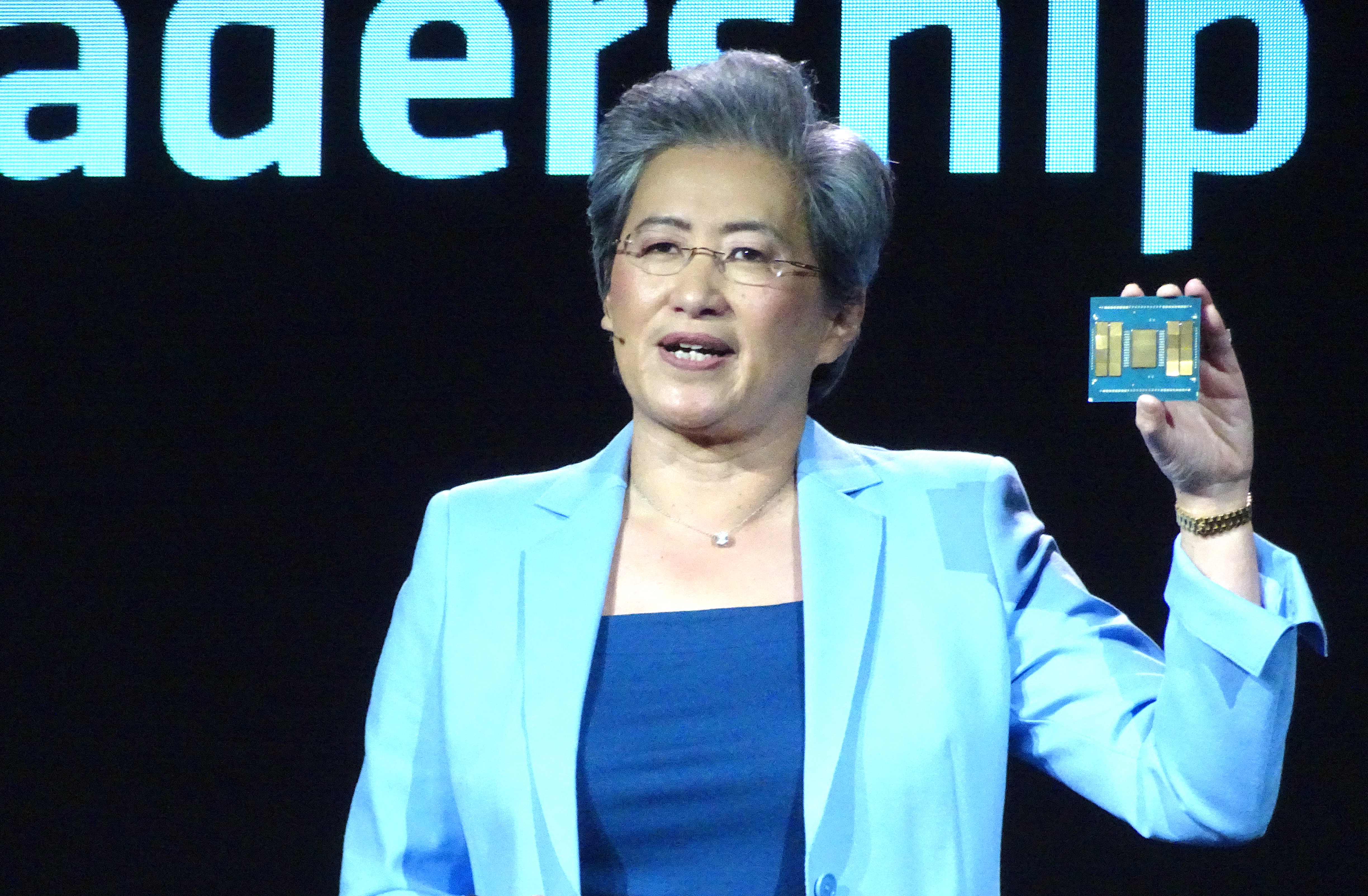A trio of U.S. chipmakers expressed confidence about their ability to navigate the challenges caused by President Donald Trump’s tariffs, offering forecasts that came in above expectations after delivering impressive results in their most recent financial quarters.
Shares of Advanced Micro Devices Inc., GlobalFoundries Inc. and Cirrus Logic Inc. all moved higher in late trading as a result of their optimistic outlooks.
AMD is by far the biggest of the three chipmakers, and its stock gained more than 4% in the wake of its latest earnings call before falling back slightly.
The company reported first-quarter earnings before certain costs such as stock compensation of 96 cents, coming in just ahead of Wall Street’s forecast of 94 cents. Revenue for the period came to $7.44 billion, up 36% on an annual basis and above the $7.13 billion analyst target. For the current quarter, AMD said it’s looking for sales of around $7.4 billion compared to the Street’s target of $7.25 billion.
AMD Chief Executive Lisa Su (pictured) said on a conference call with analysts that the company has been grappling with new regulations that further prohibit the export of its most advanced artificial intelligence chips to China. She said the current quarter forecast takes into account around $800 million in costs that are likely to be incurred by the Trump administration’s latest rules.
According to Su, the company projects it will lose around $700 million in sales in the current quarter and $1.5 billion for the whole of fiscal 2025. On the call, Su also cited headwinds from “dynamic macro environments” as a challenge, but said she expects this will be offset by “powerful headwinds from our leadership product portfolio.”
During the previous quarter, AMD racked up a net profit of $709 million, rising from just $123 million a year earlier.
AMD has emerged as a major rival to Intel Corp. in the market for central processing units for data center servers, with its EPYC-based chips slowly but surely increasing their market share over the last few years. In addition, it’s the main competitor to Nvidia Corp. in the AI industry, selling a line of powerful Instinct graphics processing units that are the subject of the new sanctions regarding imports to China. In fiscal 2024, the company’s AI GPU sales topped $5 billion.
AMD’s GPU sales fall within its data center segment, which generated $3.7 billion in revenue during the quarter, topping estimates. Sales there jumped 57% annually, thanks to high demand for both the EPYC CPUs and Instinct GPUs. According to Su, the GPUs are increasingly being used by customers for AI training, and at least one “major AI model developer” is using its chips for inference.
“I know there are some uncertainties as it relates to tariffs and other things, but this is one of those areas where from an infrastructure standpoint, there continues to be investment,” Su insisted.
AMD’s other major business segment is client and gaming, which makes chips for personal computers and games consoles. Sales there rose 28% from a year earlier to $2.9 billion, though Su said sales of chips for consoles were down 30%.
GlobalFoundries welcomes possible tariff boost
GlobalFoundries, an operator of semiconductor foundries that manufactures chips for companies such as AMD, from which it was spun off in 2009, also delivered healthy results today, beating the Street’s expectations.
The company reported first-quarter earnings of 34 cents per share, beating estimates of 28 cents, while revenue came to $1.59 billion, ahead of the Street’s $1.58 billion consensus. Net income came to $211 million, up from $137 million in the year-ago period.
In a conference call, GlobalFoundries’ outgoing CEO Thomas Caulfield said the company was seeing “stable demand” even amid choppy conditions in the automotive and smartphone markets.
GlobalFoundries isn’t really subject to the new export controls implemented by the Trump administration, but like every chipmaker it is expected to be affected by the President’s global tariff plans. In particular, tariffs on automakers – which make up the company’s third-biggest market segment – have already kicked in.
However, Caulfield said GlobalFoundries is likely to benefit from these trade policies, as tariffs on foreign-made chips will encourage more companies to source these products from its U.S. factories. Evidence of that comes from the increased revenue in the company’s automotive segment during the quarter, he added.
On the other hand, Caulfield admitted the company’s biggest segment, smartphones, is facing pressure, and sales there are likely to decline this year.
Nonetheless, GlobalFoundries offered an upbeat forecast for the current quarter, saying it’s looking for revenue of $1.68 billion at the midpoint, ahead of the Street’s $1.67 billion target. It also forecast earnings of 36 cents per share versus the Street’s estimate of 35 cents.
The company’s stock rose almost 2% in extended trading.
Cirrus Logic crushes Street’s forecasts
Cirrus Logic was by far the biggest gainer of the three chipmakers during the after-hours action. Its stock rose more than 4% after topping expectations in its fourth-quarter results and offering very strong guidance.
The company delivered fourth-quarter earnings of $1.67 per share on revenue of $424.5 million, crushing the Street’s targets of $1.15 in earnings and just $380 million in sales.
Despite the astonishing earnings and revenue beat, Cirrus Logic was unable to boost its bottom line, with net income coming to just $71.3 million in the quarter, down from a $331.5 million profit one year ago.
The company, which makes chips such as digital signal processors, amplifiers and mixed-signal integrated circuits used in high-end audio systems, smartphones and automotive infotainment systems, said it’s looking for sales of between $330 million and $390 million in the current quarter. The midpoint of that range is well ahead of the $340.1 million analyst estimate.
“We are pleased with our achievements during the year, with the company making excellent progress executing our strategic growth plan,” CEO John Forsyth told analysts.
Featured photo: Robert Hof/ News
Your vote of support is important to us and it helps us keep the content FREE.
One click below supports our mission to provide free, deep, and relevant content.
Join our community on YouTube
Join the community that includes more than 15,000 #CubeAlumni experts, including Amazon.com CEO Andy Jassy, Dell Technologies founder and CEO Michael Dell, Intel CEO Pat Gelsinger, and many more luminaries and experts.
THANK YOU








